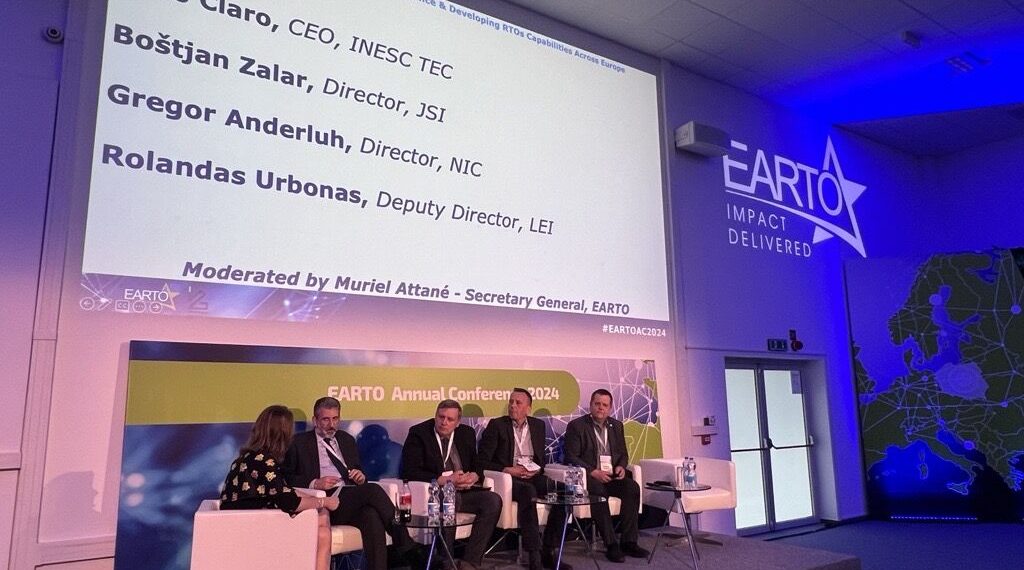The role of R&D institutions in supporting the EU open strategic autonomy was the theme of the annual conference of EARTO (European Association of Research and Technology Organisations), which took place in Warsaw, Poland. João Claro, Chairman of the Board of Directors and CEO at INESC TEC, was one of the speakers.
Three panels: the first on the role of European research and technology organisations (RTOs) in the reindustrialisation of Europe; the second on the definition of research, development and innovation policies through technological infrastructures, and the third, and last, on the dissemination of excellence and development of RTOs capabilities across Europe. João Claro featured in the last session.
The intervention of the Chairman and CEO at INESC TEC focused on the European Widening programme, considered one of the key tools for strengthening national innovation ecosystems, capable of promoting partnerships of excellence at the international level and contributing to the strengthening of the European Research Area. Data from 2023 shows that Portugal had already raised €179.6M in this programme to support research and innovation in the country; also, since 2014, Portuguese institutions had already been able to participate in more than 200 projects, coordinating 172.
The third panel focused on some of these figures. INESC TEC, in the Widening programme alone, managed to coordinate two Twinning funding projects – worth almost €2M – and the participation in an ERA Hub Pilot, with a €1.4M contribution to the institution. Regarding the Horizon Europe funding programme, of the seven submissions made to date, one has already been approved and three are awaiting publication of results.
According to João Claro, the basic conditions to boost the excellence and capacity development of RTOs at European level, especially in the convergence regions in Europe, include a strengthening of the competences of all stakeholders e.g., infrastructures, education and training, and knowledge sharing, a development of the ecosystem (based on diversified networks of stakeholders that are promoted through cluster policies), and a stable base financing, which is something critical for RTOs to better identify and support the needs of the European industrial sector.
According to INESC TEC Chairman, accessing the results of European projects, thus promoting cross-fertilisation and greater exploitation of results and participation in projects and initiatives financed by the European Union – using the structural funds, namely in co-funded programmes – are also a way to support and boost regional systems, thus accelerating convergence towards greater excellence.
But political aspects also play a relevant role. “Having a public administration capable of understanding innovation cycles, ecosystems and flows and appropriate policies, programmes and instruments at European, national and regional levels is extremely important if we aim to discuss how best to train European RTOs”, explained the Chairman of the Board of Directors at INESC TEC.
In 2025, Portugal observes the 40th anniversary of the signing of the treaty that allowed the country to become part of the current European Union, and INESC TEC will also celebrate its 40th anniversary. “We were born in Europe, and the integration of our Institute, our region and our country into the European research and innovation ecosystem has become part of our DNA. Our goal is to keep encouraging the dissemination of experience and advocate for an even more promising future for the Widening programme”, stated João Claro.
In addition to the Chairman of INESC TEC, the third panel included Boštjan Zalar, director at the Jožef Stefan Institute (JSI) (the largest public research institute in Slovenia), Gregor Anderluh, director of the National Institute of Chemistry (NIC), also from Slovenia, and Sigitas Rimkevičius, director of the Lithuanian Energy Institute (LEI).
This year’s Annual Conference was hosted by the Łukasiewicz Research Network – which, like INESC TEC, is a member of EARTO; the event took place on May 15 and 16 in Warsaw, Poland.
The researcher mentioned in this news piece is associated with INESC TEC and UP-FEUP.


 News, current topics, curiosities and so much more about INESC TEC and its community!
News, current topics, curiosities and so much more about INESC TEC and its community!